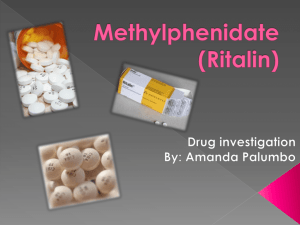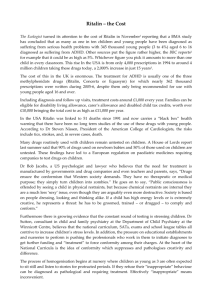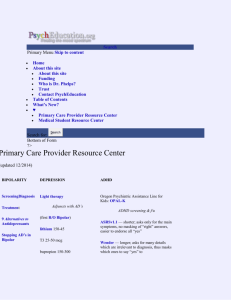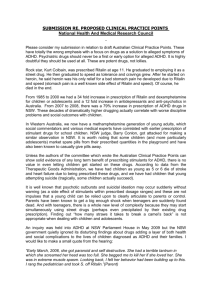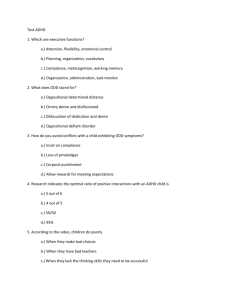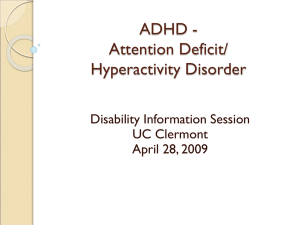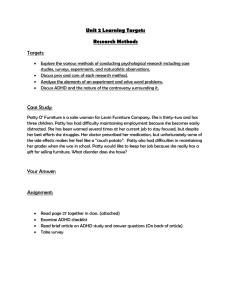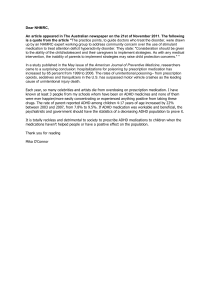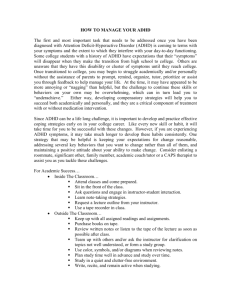The Anti-ADHD/ Anti
advertisement
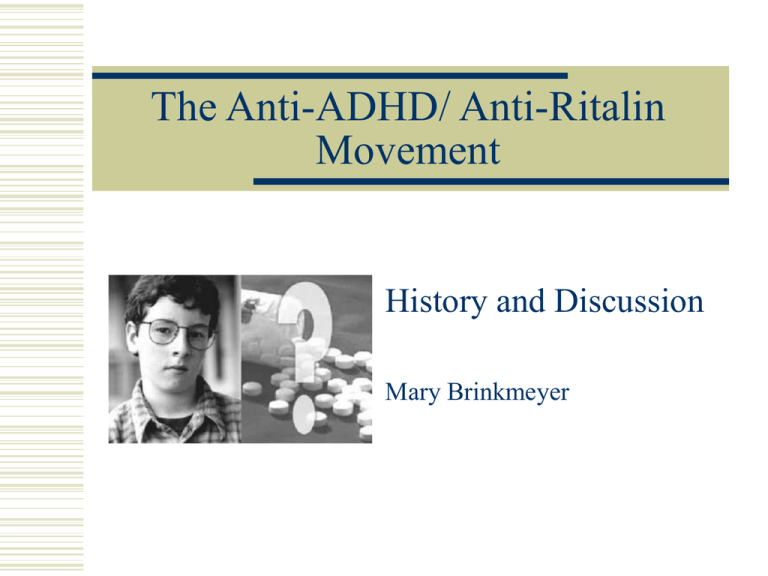
The Anti-ADHD/ Anti-Ritalin Movement History and Discussion Mary Brinkmeyer Recent Events Statistics and Controversies The Critics Recent events 1999: Colorado State Legislature holds hearings on psychotropic medications and school violence Speakers include members of “watchdog” Scientology groups Recent Events 1999 Colorado State School Board passes resolution cautioning against use of psychotropic meds Original intent of resolution was to ban Ritalin Cover of The Boulder Weekly, 2001 2000: Class Action Lawsuits Filed against APA, CHADD, and Novartis (formerly Ciba-Geigy) Alleged conspiracy to promote ADHD diagnosis for purpose of maintaining psychotropic drug industry. Alleged cover-up of dangers of Ritalin Lawsuits eventually dismissed. 2001-2003: State Bans on Schools Recommending Ritalin CT, VA, CO pass laws prohibiting educators from recommending psychotropic medications CT, UT state that refusing to give children psychotropic medications is not medical neglect Child Med. Safety Act of 2003 May 2003: Passed by House 425 to 1 Requires states “to develop and implement policies and procedures prohibiting school personnel from requiring a child…to obtain a prescription for a controlled substance.” Requires tracking of prescription rates for ADHD meds Opposed by American Psychiatric Association, American Academy of Pediatrics, CHADD, National Association for Mentally Ill. Stimulant Statistics: Cause for Concern? 500% increase since 1991 in ADHD prescriptions Preschool ADHD meds tripled from 1990-1995. In past 15 years: 311% increase in kids 15-19 taking ADHD meds 170% increase in kids 5-14 taking ADHD meds Methylphenidate manufactured 2 ½ times the rate of a decade ago 11 million prescriptions written each year 2000 profits for stimulants = $758,000,000 The New York Times, The Drug Enforcement Administration, Education World Stimulant Statistics: Cause for Concern? Methylphenidate Consumption (Defined Daily Dose in millions) Drug Enforcement Administration Over-diagnosis and overprescription? Jensen’s 1992 survey of stimulant use in selected regions found only 12.5% of ADHD kids treated with stimulants. LeFever’s 1995 survey of VA schoolchildren found rates of medication 2-3 times higher than expected, with 20% of 5th grade white boys taking ADHD meds. Rates much lower for girls and black children. Over-diagnosis and overprescription? Angold’s 1992-1996 survey of rural NC children found almost twice as many kids on stimulants (7%) as met DSM-III ADHD criteria. Stimulant meds more common in comorbid ODD kids. Bussing (2003) found poverty and minority status negative predictors of receiving any tx for ADHD. Methylphenidate Abuse Can be abused in following ways: Orally (more common when used to stay awake) Crushing and snorting tablets or dissolving in water and injecting (used to produce euphoria) Methylphenidate Abuse: 2002 Stats Drug Grade Ritalin % Alcohol % Cocaine % Heroin % MDMA % Pot % 8th 3 39 2 1 3 15 10th 5 60 4 1 5 30 12th 4 72 5 1 7 36 Monitoring the Future National Survey of 420 Schools Methylphenidate Abuse 1993-1999 American Association of Poison Control Centers reported 759 cases of methylphenidate abuse in kids ages 10-19 brought to ER. Most not prescribed the drug Number of cases increased over time Most not admitted, and medical outcomes good. Klein-Schwartz & McGrath, 2003 Methylphenidate: A Gateway Drug? 4-year study of boys ages 15-19 56 medicated ADHD, 19 un-medicated ADHD, 137 controls Rates of substance use disorder at 4-year follow up significantly higher for un-medicated ADHD Suggested “protective” effect of ADHD meds. Biederman et al., 1999 CHADD: The 1995 Merrow Report (PBS) Expose CHADD receiving hundreds of thousands in funding from Ciba-Geigy No mention of this in brochures, educator’s manual, fact sheets, etc. CHADD: The Merrow Report No mention of Ciba-Geigy link in CHADD video distributed using grant from US Dept. of Education Dept of Ed officials not aware of Ciba-Geigy link. Video showed parents highly praising Ritalin without identifying themselves as CHADD leaders. Video distributed when CHADD’s fight for decontrol of Ritalin heating up. CHADD: The Merrow Report UN International Narcotics Control Board expressed concern. Two days after Merrow Report aired, Dept of Ed pulled video. CHADD: Current Status Still receive 17% of funding from pharmaceutical industry (2002 report) Acknowledge this on publicly-published financial report (not that easy to find) Discuss commitment to ethics and not allowing contributions to influence policy and statements Discuss importance of psychosocial interventions The Critics: The Good, the Bad, and the Nutty Concerned Practitioners Lawrence Diller: Running on Ritalin (1998) Behavioral pediatrician and family therapist who regularly prescribes Ritalin Worries Ritalin is “easy solution” for often complicated situations Raises concerns about ADHD being misdiagnosed. Concerned Practitioners Peter Breggin, Talking Back to Ritalin Psychiatrist, opposes all psychotropic medications for kids Argues ADHD not biologically-based, drugs are cop-out for parents, doctors, and teachers Says meds “crush a child's desire to socialize, to play, to escape, to be full of stuff like kids are” Often testifies at anti-Ritalin hearings Scientologists Scientologists have opposed psychiatry and psychology since failed to accept founder L. Ron Hubbard’s theory of “dianetics” in 1960s. Main anti-psychiatry arm: Citizen’s Commission for Human Rights (CCHR). Celebrity spokespeople: Kirstie Alley, Lisa Marie Presley, Kelly Preston, Juliette Lewis, Jenna Elfman, Issac Hayes. CCHR: Selected Publications Psychiatry Betraying & Drugging Children - Harming Lives Psychiatry Destroying Religion - Creating Evil Psychiatry's Betrayal - Creating Racism Psychiatry Victimizing The Elderly - Denying Respect Psychiatric Rape - Betraying Women Psychiatry Eradicating Justice - Creating Crime Psychiatry Destroying Morals - Creating Chaos Scientologists Dr. Fred Baughman (neurologist): leading speaker for CCHR Website www.adhdfraud.com Frequently quoted by anti-ADHD activists without acknowledgement of Scientology connection Main proponent of conspiracy theory. Proponents of Alternative Therapies Hundreds of books on treating ADHD without drugs. Range from fairly sound behavioral principles to diets, supplements, exercise, etc. Rarely include any empirical data. Questions, Discussion
